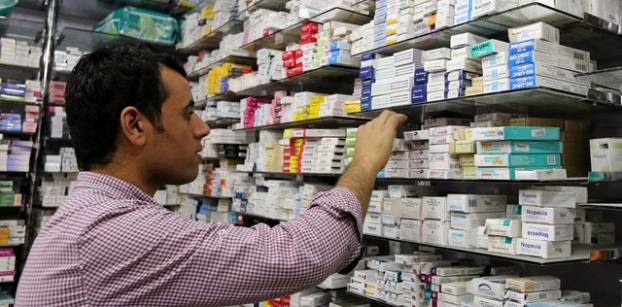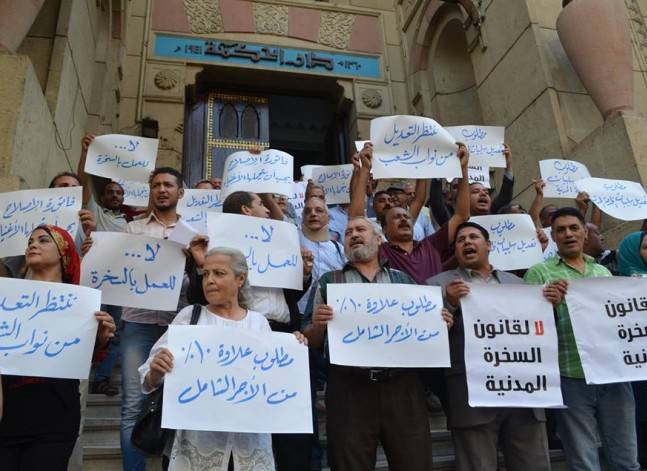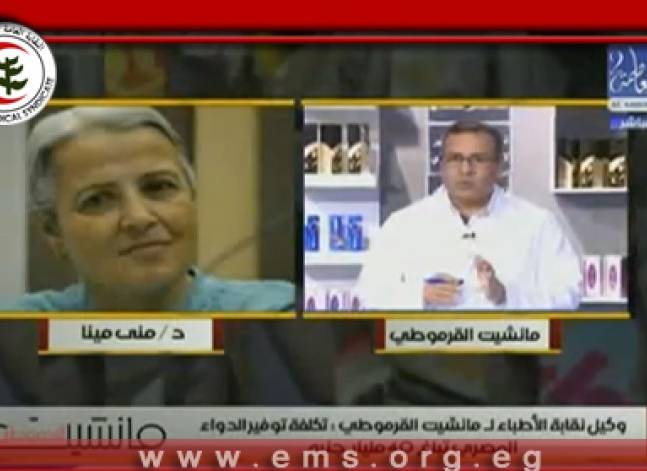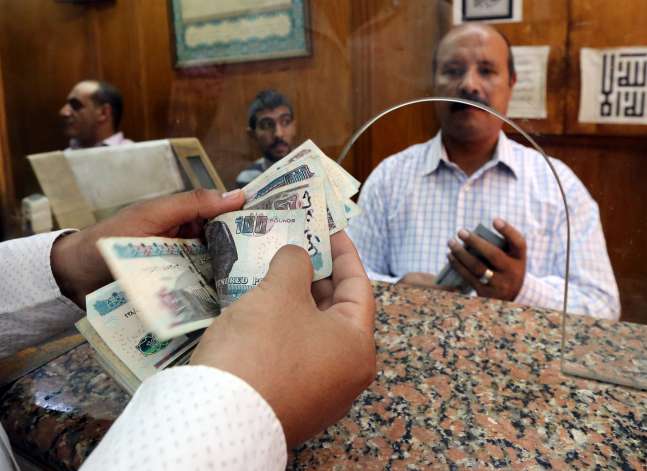Latest NEWS
- Aswat Masriya, the last word
- Roundup of Egypt's press headlines on March 15, 2017
- Roundup of Egypt's press headlines on March 14, 2017
- Former Egyptian President Hosni Mubarak to be released: lawyer
- Roundup of Egypt's press headlines on March 13, 2017
- Egypt's capital set to grow by half a million in 2017
- Egypt's wheat reserves to double with start of harvest -supply min
- Roundup of Egypt's press headlines on March 12, 2017
Currency drop hits Egypt's medicine supplies, angering public
A pharmacist searches for medicine at a pharmacy in Cairo, Egypt, November 17, 2016. REUTERS/Mohamed Abd El Ghany
CAIRO, Nov 22 (Reuters) - Pharmacies across Egypt are running short of medicines, some of them life-savers, as a plunge in the value of the Egyptian pound coupled with strict government price caps has made scores of products unprofitable to produce or import.
The shortages include some cancer treatments as well as basic items like insulin, tetanus shots and contraceptive pills.
Unable to raise prices above levels set by the Health Ministry but now paying roughly twice as much to import drugs or active ingredients, pharmaceutical firms say they have been forced to phase out certain medicine to stay in business.
"We aren't a charity. We have expenses and production costs, and if a company isn't making profit it will have to halt production," said Said Ibrahim, factory manager at EIPICO, one of Egypt's largest pharmaceutical companies.
That brings no comfort to pharmacists and sick Egyptians.
Out of insulin for weeks, Ali Etman said he was recently forced to turn away eight diabetes patients from his Cairo pharmacy in a single day.
"Patients who come looking for insulin ask me: 'What am I supposed to do? Die?' and I don't know what to tell them. I don't have the drugs they need," Etman said.
Egypt floated its currency on Nov. 3, abandoning a peg of 8.8 pounds to the U.S. dollar and allowing the currency to roughly halve in value to about 17.50 on Tuesday.
The float helped the cash-strapped government clinch a $12 billion IMF loan it hopes will unlock investment and revive growth that has been hampered by political uncertainty since the 2011 uprising that toppled President Hosni Mubarak.
But the medicine shortages are piling pressure on the government of general-turned-president Abdel Fattah al-Sisi, who has been at pains to reassure a populace already struggling with double-digit inflation and intermittent shortages that they would be shielded from the worst effects of economic reforms.
Talk of a looming healthcare crisis has dominated popular evening chat shows, with doctors calling in nightly to report rapidly depleting stocks and patients being turned away from hospitals for lack of supplies.
The Health Ministry has blamed the problem on panicking Egyptians hoarding medicines and said it would not raise prices.
Drug shortages are not new to Egypt. More medicines had already begun disappearing from shelves early this year as a severe shortage of dollars in the banks meant pharmaceutical firms could not pay for the necessary imports.
Egypt has struggled to earn enough dollars since the 2011 uprising scared off foreign investors and tourists and the central bank drained its reserves defending the currency peg.
The Health Ministry set up a Drug Shortages Directorate in 2012 to minimize the impact by suggesting suitable substitutes for missing medicines. But the situation has only worsened.
EIPICO's vice president told Reuters about 1,600 drugs had gone short in recent months, including 35 that have no alternatives and would disappear from the market if price caps were not eased.
"Distributors are now telling pharmacies nothing imported is available. The problem has been going on for a while, but has only turned into a crisis in recent weeks," Etman said.
Situation worsening
Egypt's drugs market is 40 percent multinational - big suppliers include Pfizer, Novartis, GlaxoSmithKline and Sanofi - and 60 percent domestic. Nearly all of it is in private hands, with annual sales worth a total of about 50 billion pounds before the float.
Ahmed al-Ezaby, head of the medicine industry division at Federation of Egyptian Industries, said Egypt imports about $600 million in finished medicines per year and $1.8 billion in active ingredients.
Officials at multinationals said they were concerned at the worsening situation. One industry source said companies were now in talks with Egyptian ministries on the possibility of restoring some prices to pre-Nov. 3 levels, in dollar terms, to ensure supplies of the most critical medicines.
The multinationals have local factories set up but 15-20 percent of drugs are imported, while 80-85 percent are produced locally. About 70 percent of all drugs in Egypt are generic and domestic-made.
A spokesman for Sanofi said the French group was "actively engaging local authorities to define a sustainable pricing mechanism."
Egypt's supply problems echo those in Venezuela, where a lack of dollars has also created drug shortages and left manufacturers nursing big losses.
Before the flotation, Egypt faced a dollar shortage that saw imported goods ranging from electronic equipment to sugar disappear briefly from shelves in the past year.
The central bank rationed supplies via weekly auctions, earmarking the little it had for essential items like medicine.
Dollar supply is less of an issue since the flotation. But the cost of buying the greenback is because companies import active ingredients they need to make generic medicines.
The government, which already raised prices on a slew of medicines this year, is under pressure to keep drugs affordable for tens of millions of poor Egyptians.
It has blamed the crisis on hoarding and greed.
"It's an orchestrated crisis. The decision to float the pound was taken...and two hours later people began saying we have a crisis and we don't have meds," Health Ministry spokesman Khaled Mogahed told the Egyptian TV channel Mehwar.
"It's a way to push for a rise in medicine prices, which will not happen."
Mogahed did not respond to requests from Reuters for comment.
The companies want the government to remove the price caps entirely or re-adjust them to ease their losses.
The Health Ministry met last week with drug industry leaders to discuss an emergency plan. It has offered to subsidize pharmaceutical companies to the tune of $165 million to support imports of life-saving drugs that have no viable substitutes, including some cancer treatments.
Companies said the amount was not nearly enough while rolling out a new subsidy program would take time.
"There's no way of knowing how long this amount will last because cancer drugs are expensive and it depends on the shortages, but the amount is not enough to solve the problem," said Adel Abdel Maksoud, head of the pharmacy division at the Cairo Chamber of Commerce.
Twitter pharmacy
In the meantime the companies say they have to stop offering the drugs which most cut into their profits. Some have already sent back shipments that were ordered before the float but arrived after, as selling them at the fixed prices would have created big losses. They all say they have to downsize and cut out certain drugs.
"We're working on a strategy to eliminate any product that's not profitable. But companies that depend on unprofitable products will be forced to shut down now given the new currency rate," said ITO Pharma's deputy general manager Mohamed Geoushy.
More life-saving drugs will soon disappear, he said.
His company is one of only two suppliers of cyclosporine, a drug used to prevent organ rejection during transplants. It recently stopped importing the drug, he said.
Pharmacists say patients have no choice but to resort to a black market for once-common items like saline and glucose at prices often 10 times higher than the official caps and far beyond the reach of most.
On Twitter, resourceful Egyptians have set up the hashtag "Twitter_Pharmacy" to swap medicines they cannot find in shops. Hospitals are using social media to advertise their needs.
"Every minister should have sat down with the government after the float and discussed an emergency plan because it's a crisis if patients can't find life-saving medicines," said Osama Tahoon, general manager of medicine producer Julphar Egypt.
"We can give up sugar or tea, but we can't give up medicine." -Additional reporting by Ben Hirschler in London














